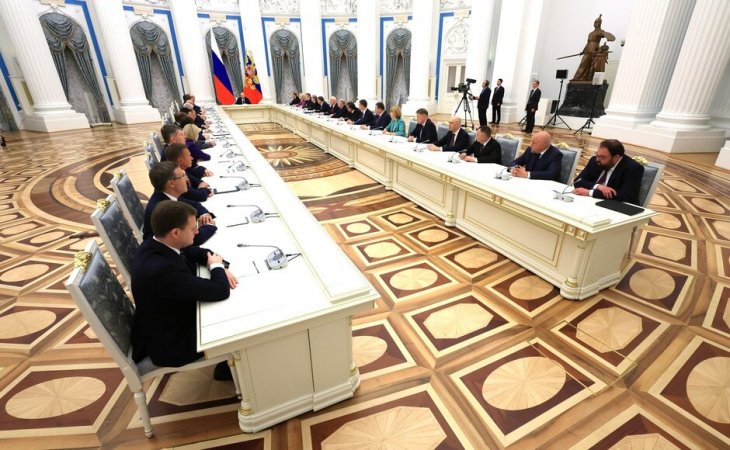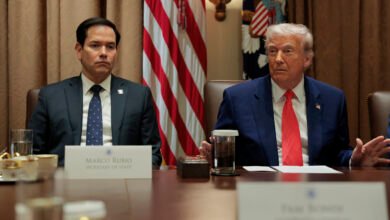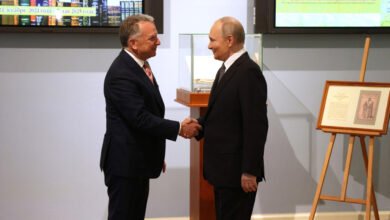Russian President Vladimir Putin has issued reassurances of his readiness to negotiate an end to his war against Ukraine many times over the past 27 months, which Kyiv has duly rejected as attempts to pressure it to capitulate (see EDM, January 29, February 6, 26, April 15).

Meeting in the Russian cabinet in the Kremlin in May, 2024. Photo: Kremlin Press Office/Anadolu via Getty Images
A maneuver executed last week may, however, signify a change in Russia’s war strategy. Instead of yet another statement, the Kremlin orchestrated a series of “leaks” that were originally collected by the Reuters news agency.
Ambivalent disproval of leaks
The agency immediately disproved the leaks, but in such an ambivalent way, that the substance may appear confirmed (Reuters; RBC; RIA Novosti, May 24). The main message is that Putin is allegedly ready to freeze the hostilities along the current frontlines and is confident that he can “sell” this compromise as a victory despite abandoning the maximalist goals of rolling back North Atlantic Treaty Organization (NATO) enlargement and enforcing the “de-Nazification” of Ukraine (Kommersant, May 24).
These leaks likely seek to derail the final preparations for the Ukraine peace summit, scheduled for June 15 and 16 in Bürgenstock, Switzerland, which the Russian propaganda machine relentlessly decries (Rossiiskaya gazeta, May 24). Putin has complained about how Russia has not been invited while arguing that Russia is not interested in discussing the Ukrainian vision of a peace settlement, which departs far from the “reality on the ground” (Kommersant, May 24). Moscow has taken note of the changes in the summit’s agenda, which now focuses more on global problems such as food security and nuclear risks (Izvestiya, May 22). Additionally, Russian diplomacy has invested significant efforts in undermining the event’s credibility. Moscow is now worried that Ukraine’s readiness to downplay the crucial issue of restoring its territorial integrity might convince China, India, and many states from Africa, Latin America, and the Middle East to send delegations to Switzerland (RIAC, May 22).
Xi Jinping’s “peace plan”
China’s position on this conflict is certainly of crucial importance to Russia. While making a ceremonial visit to Beijing two weeks ago, Putin expressed full support for Chinese Communist Party General Secretary Xi Jinping’s “peace plan”, even if the implicit rejection of the Russian annexations is a tall stumbling block (see EDM, May 13; Nezavisimaya gazeta, May 22). Acknowledging this kowtow, Chinese Foreign Minister Wang Yi suggested during a visit to Brazil that a result-oriented peace conference must include Russia and take into account its security interests (see EDM, April 17; The Moscow Times, May 24). Despite Putin’s best efforts at cultivating partnership, China’s support for Russia’s war effort remains conditional, and the volume of Moscow’s imports of badly needed technologies and machinery has been curtailed by Western sanctions (Re: Russia, May 17; Svoboda.org, May 21). Beijing is keen to minimize the damage from the “long war” on Russia’s economic ties with Europe, and the proposition for reducing the intensity of fighting answers very well its policy of exploiting differences in the European Union (see China Brief; Carnegie Politika, May 24; TopWar.ru, May 17).
Nuclear escalation
The threat of nuclear escalation remains a main theme in the discourse on the global consequences of the war in Ukraine, which Moscow and Beijing interpret somewhat differently. China argues consistently for careful management, while Putin persists with brinksmanship. The most recent step is the joint Russian-Belarusian exercise of tactical nuclear forces (Interfax, May 21; see EDM, May 23). It may appear counterproductive to proceed with this provocative drill while sending a message of readiness for a ceasefire. Still, the demonstration of nuclear might has been executed to impress the risk-averse Europeans and make them more receptive to the pseudo-peace signaling (Izvestiya, May 6).
Small territorial gains
The main driver of the diplomatic intrigues is the course of pitched battles in trench warfare, in which Russia still holds initiative (Republic.ru, May 21). The recent Russian offensive in the Kharkiv region has, however, yielded only a few destroyed villages at the price of heavy casualties. Even “military-patriotic” Russian commentators question its strategic rationale (TopCor.ru, May 22). This sequence of attacks has also compelled NATO Secretary-General Jens Stoltenberg to state the obvious: US and German objections to using supplied long-range weapon systems for strikes inside Russia’s territory make no sense (Meduza, May 25). These small territorial gains may, however, play a significant political role in adding credibility to Putin’s hints—a suggestion to withdraw back to the border can amplify the arguments for arranging a temporary ceasefire and “persuading” Ukraine to make it permanent.
Cadre purge
The unprecedented cadre purge in the Defense Ministry following the replacement of long-serving Sergei Shoigu by inexperienced Andrey Belousov at the helm constitutes corroborating evidence of the Kremlin’s ambiguous scheme (see EDM, May 16, 20, 22, 23; Svoboda.org, May 24). Shoigu seems to have been “punished” by his appointment as the secretary of the Security Council but keeps appearing with Putin on high-profile occasions, such as the visit to China (Carnegie Politika, May 20). Several of Shoigu’s deputies, however, have been arrested on corruption charges (easily provable), and more have resigned (see EDM, May 20). Belousov, who has no team of followers, is currently facing bureaucratic chaos in the huge and hostile ministry (Novaya gazeta Europe, May 21). He needs time to establish new controls over massive financial flows, and a pause in the permanent force majeure produced by combat operations would be beneficial (Meduza, May 23). The leaders of the military-industrial complex, with whom Putin had a meeting last Saturday, would also prefer to transition from an emergency rush to a more stable demand codified in the new State Armament Program, which the government has started to prepare (Vedomosti, May 24; RBC, May 25).
Putin may yet decide against taking a break in the ground offensive and the bombing campaign, concluding that a permanent domestic mobilization for the long war better guarantees the stability of his rule. Creating an option for a ceasefire, however, may grant him more flexibility in setting a new balance of parochial interests in the Kremlin court and maneuvering across the international arena. He can assume that direct threats boost European unity and transatlantic solidarity but may erode quickly if the confrontation is temporarily eased.
Another consideration is the possible impact of a truce on the domestic situation in Ukraine, where the leadership of President Volodymyr Zelenskyy is perceived as falling apart. Whatever intrigues Putin tries to spin, his aim of destroying Ukraine as an independent European state remains fixed — and is set to be defeated by Ukrainian resilience and Western resolve.
Source link




